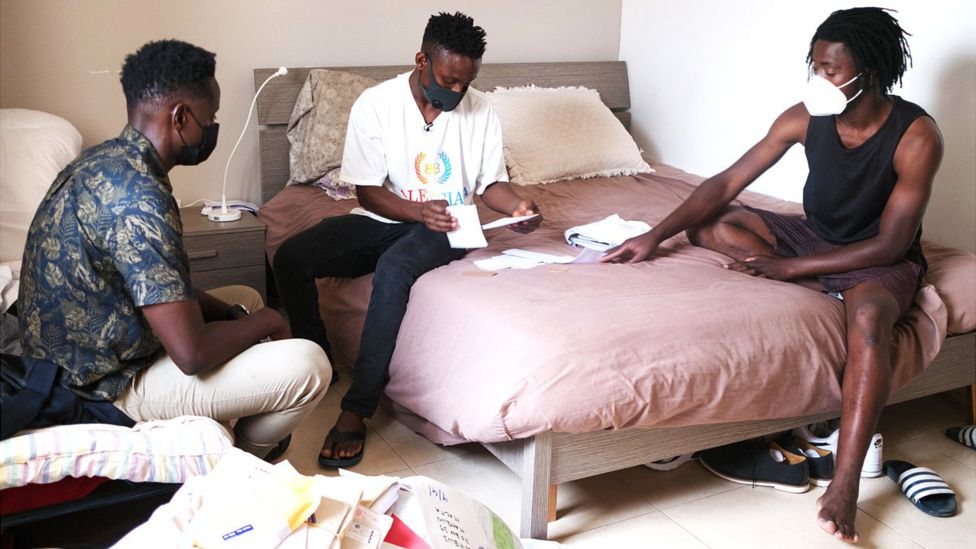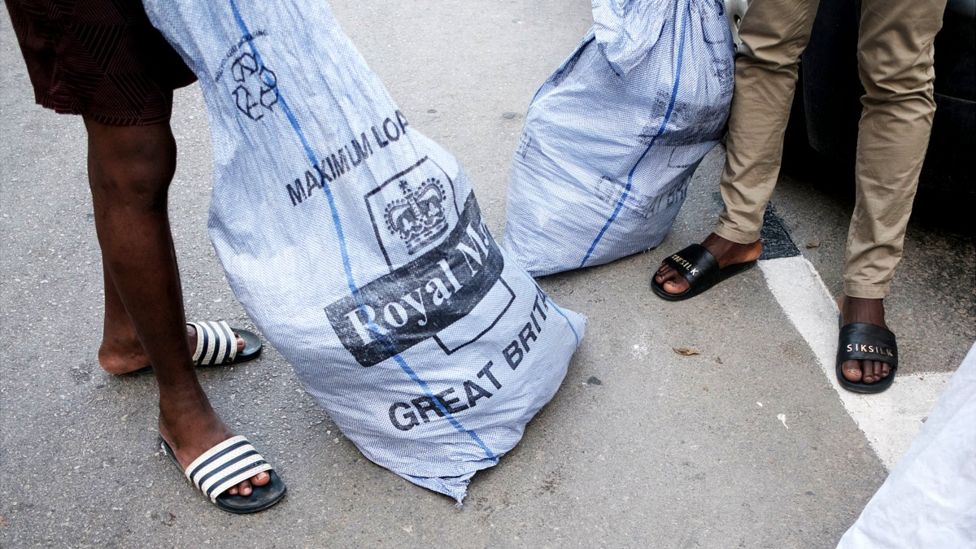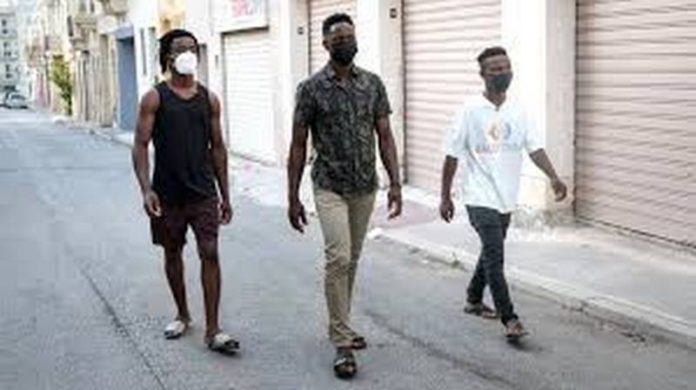Lamin squints at the sun as he points across the harbour. “This place reminds me of the worst day of my life,” he says.
It is where he was handcuffed by Maltese soldiers and led away to a maximum-security prison. He was only 15 at the time and, unknown to him, a suspected terrorist.
It was just a misunderstanding, he thought. Once everyone realised what had happened, he would be freed. But that was two years ago. Today Lamin, from Guinea in West Africa, stands accused of hijacking the ship that rescued him at sea and brought him to Europe.
This alleged act of terrorism could put him in jail for the rest of his life.
So how did a child refugee end up in Malta facing accusations of such a crime? For six months I have been investigating this curious case. It is a story of fear, desperation and of being in the wrong place at the wrong time – as a small country decided to take an almighty stand.
Perilous journey
Lamin had never envisaged making the treacherous journey across the Mediterranean. He ran away from home aged 13 because of a family feud. After making it through the baking Algerian desert – passing the bodies of others who hadn’t survived – he was convinced by a friend he’d find work in Libya. There, he cleaned houses for three months for no pay, until his boss offered to help him travel to Europe.
As they set off from the Libyan coast, Lamin remembers the dinghy in which he was travelling deflating. But it was too late to back out, and smugglers were shooting from the shore at him and the other 100-plus people on board. Soon, there was no air left inside the dinghy.
Lamin sat with the women and other children. One woman was wailing and asking Lamin if she was going to die. “I couldn’t bear to tell her the answer, I was crying so hard. There wasn’t a single person who wasn’t crying.”
By the time I meet Lamin in Malta, he’s 17. He speaks softly, in near-perfect English. His mother sent him to an English-speaking school in Guinea, hoping it would give him more opportunities. But this gift would turn out to be his curse.
The sinking dinghy was spotted by an EU patrol plane, which asked a passing oil tanker – en route from Turkey to Libya – to assist. Lamin was the first to climb up the ropes and board the tanker. It was immediately clear this was not a rescue ship. The Arabic writing on deck made people nervous. “Where are you taking us?” they asked. “To Europe?”
The ship and its captain shared the same name. The tanker was called El Hiblu 1 – and a Libyan man, Nadar El-Hiblu, was at the helm. In English, he told the migrants he had been instructed to wait and that more boats would come to take them to Europe. But the migrants didn’t understand what he was saying. Lamin was the only one of them who spoke English, and ended up becoming the translator.

As he relayed the news, people started dancing and singing. But the other boats never came and, in the middle of the night, for reasons that are unclear, Nadar set off for Libya.
As dawn broke, land was in sight. At first people were excited – they thought they had reached Europe. But then someone recognised the harbourside lights of the Libyan capital, Tripoli. People started to panic. “No Libya, no Libya,” they screamed. Some threatened to jump overboard, saying they would rather drown than go back.
Lamin recalls how Nadar came out of his cabin to confront the commotion and to search for “the boy who speaks English”. But Lamin didn’t want to get involved. Some of the other migrants had turned on him, accusing him of lying about going to Europe.
Meanwhile, two other teenagers – 19-year-old Abdalla from Guinea and 16-year-old Abdul from Ivory Coast – were trying to calm down others. Eventually, says Lamin, all three of them agreed to speak to the captain in his cabin. Lamin says he explained why people were so distressed. If they were sent back to Libya, some of them would certainly die.
The horrors facing migrants in Libya have been well-documented, with cases of rape and torture in notorious detention centres. Under international maritime law, ships must take those they rescue to a safe place. Many organisations have declared Libya unsafe.
“Maybe he felt sorry for us,” Lamin says, “but at this point he agreed that if people calmed down, he would take us to Europe. He said he didn’t have enough fuel to get to Italy, but he would take us to Malta instead.”
The ‘terrorists’ arrive
Lamin had never heard of Malta, but he delivered the message to the other migrants. Captain Nadar set sail for the Mediterranean island, 220 miles (355km) north of Tripoli. But when he approached, he reportedly told the Maltese authorities across his radio that he was not in control of his ship.
A frenzy was building in Valletta – Malta’s capital. There was talk of pirates and then of terrorists. When the ship arrived, TV cameras and the military were waiting. Preliminary terrorism charges were made against Lamin, Abdalla and Abdul. Together, they would soon become known as “the El Hiblu three”. The 100-plus other migrants, and the captain and crew, were free to go.
Malta is often the first place in Europe that migrants coming from Libya reach and, in spring 2019, the attitude towards them was particularly hostile. In the preceding years, it had taken in thousands of people, but the hospitality had dried up. At the same time, the EU’s search-and-rescue boats had disappeared from the sea. The strategy was to co-operate with the Libyan coastguards, to prevent and deter people from making the journey.
What exactly happened on board the oil tanker has not been proved. In a court hearing, Nadar maintained he had not been in control of the vessel. Lamin has not been given the chance to explain in court what happened, and all three of the young men are yet to be formally charged. The authorities are still gathering evidence.
Lamin spent eight months in prison, before being released on bail. He now has a room in a centre for young migrants. He cannot leave the island and has found work on a construction site, getting up at 05:00 each day to be there on time.
Twice a day, he has to check in at a police station or faces being put back into detention – one of his many strict bail conditions. Lamin calls out “129” to the officer behind the counter. She calls back, repeating his official number without turning around. “That’s my name now,” he laughs.
Those close to Lamin say his mental health has deteriorated since arriving in Malta. He is plagued by the thought of spending his life behind bars.
“How am I a terrorist?” he pleads. “I didn’t fight, I didn’t shout. Terrorists kill innocent people, I only wanted to help people understand each other.
“There were a lot of people on that boat bigger and stronger than us three. If this had been a hijack, they would have been the ones inside the cabin – but the captain chose us.”
Slow justice
In the days after the rescue in 2019, the prosecution rushed to take evidence from the captain and crew, before letting them leave Malta. But neither the three young men, nor a single one of the other 100-plus migrants on board, were called to give their versions of events.
It wasn’t until March 2021, after continued complaints from the trio’s defence lawyer, Neil Falzon, that the prosecution summoned the first migrant witness.
“There are more than 100 people with crucial information about what happened, but as time goes by it is getting harder to find them and memories have faded,” he says. Many are no longer in Malta.

Abdul is now 19. He is full of energy but broke his leg badly last year falling from a construction site. He’s teaching himself driving theory in the hope one day he can learn for real. He says staying busy and cheerful is the only way he can stop the authorities taking what little is left of his life, because they already have his freedom.
Abdalla is more reserved. He and his wife, who crossed the Mediterranean with him, now have an eight-month-old daughter. They made the journey after his father died. He’d quit his sociology degree to support his family, but struggled to provide enough. Europe seemed the only hope. He doesn’t like to talk about the case or his future, and says he can’t think past tomorrow.
There are so many unanswered questions about this case.
I tried for months to get someone from the Maltese police or prosecution to talk to me, either on or off the record, without success. I asked time and again for simple answers to questions.
For how much longer will they be gathering evidence? When will the trio be able to give evidence? Why was there a two-year gap between taking evidence from the captain and crew, to hearing from the first migrant?
But whenever I mentioned the case of the El Hiblu three, all I got was, “no comment”.
What the others saw
I track down some of the other migrants picked up by the El Hiblu. They are nervous at first, but then agree to tell me their version of events.
They tell me the captain had sworn on the Koran that they would be taken to Europe. People were angry and desperate. Some picked up metal scraps and started banging them against the cabin windows in protest. The scene they paint is an intimidating one, of 108 distressed people hell-bent on not returning to Libya.
But, clearly, they describe Lamin, Abdul and Abdalla as peacekeepers. They say Abdalla and Abdul managed to calm the group and convince people not to cause any harm. It was then the captain came out to invite them and Lamin into the cabin to make a plan.
“These three boys, they saved us all. If they hadn’t been there with us, I doubt any one of us would be here now,” one of them, Bakary, says.
Kammisoko, who was the first on board to realise they were being taken back to Libya, starts to weep. They are tears of shame, he says. The lives of three children are being destroyed for the sake of theirs. He says he has gone to the court twice begging to give evidence, but hasn’t been allowed to.
Whatever happened on the tanker, human rights organisations say that to label these three young men as terrorists is a serious overstretch. Even the one police officer I managed to get on the phone admitted as much, before insisting he wasn’t very involved in the case.
The UN office of the High Commissioner for Human Rights has called the preliminary charges disproportionate and asked the Maltese authorities to reconsider. The Catholic Church has also publicly criticised the case, with the archbishop of Malta calling for the charges to be dropped.
“We believe this is a case of injustice, that these charges are an exaggeration,” Reverend Anton D’Amato says, speaking on behalf of the archbishop.
“We can’t understand why three teenagers, who were trying to escape somewhere terrible, and who were acting as interpreters, could be accused of terrorism.
“Migration is not a crime and we hope they are freed as soon as possible.”
Back in court
When I try to find out why Malta is taking such a tough line and why no-one official will talk to me about the case, there are a few theories.
The most likely, I’m told, is that the authorities know they were too heavy-handed. They acted too fast, before the facts had been established, determined to prove Malta’s might. Now they have backed themselves into a corner.
But, without talking to them, I can’t know if this is true.

“So far we haven’t seen evidence of terrorism and we question the ability of the prosecution to bring such evidence,” Mr Falzon tells me, as he gathers the trio outside court in the capital Valetta for a rare hearing.
“What these people were fleeing from is a hell-hole. What they did was the natural thing anyone would have done to save themselves and get away from Libya.”
In the 40C heat, Lamin helps Abdul with his tie, before tucking his shirt into his jeans. As they head into court, they are noticeably nervous.
The court hears from one of the other rescued migrants. He explains how the captain called the accused into his cabin after a commotion broke out, that the three were not violent, had no weapons, and were the ones to calm down the situation.
For Lamin, Abdul and Abdalla this is one step in the right direction. But as the magistrate dismisses the court, she sets the next hearing for October. Lamin’s face falls. “They are killing us slowly,” he whispers as we leave.
With more than 100 witnesses potentially to still call, as Mr Falzon points out, it could be years before the case is taken to trial.
I manage to secure an interview with Malta’s foreign minister, Evarist Bartolo, but he won’t be drawn on the specifics of the case. He denies though that it is being used to make a political point.
But he’s clearly frustrated. “Can you try to empathise with such a small state trying to cope with this?” he snaps when pushed. As he sees it, Malta has been abandoned by other EU countries to deal with migration alone.
“I think it’s unfair to focus on a case which deals with three people – and paint Malta as a rogue, insensitive state and we don’t care about these people. We’ve done our bit, we have saved thousands of people.”
He insists it would be different if there was international help, but says there is no appetite from other European countries to relocate those who arrive.

The one person I wanted to speak to more than anyone was the captain, Nadar, but he has not been heard from since he was allowed to leave Malta.
Why did he take the migrants back to Libya? And why did he then change his mind? Was he scared or did he feel sorry for them?
I was given a number for his brother, Saleh El-Hiblu, the owner of El Hiblu 1. Saleh answers and tells me to call back later, when he will be with Nadar. I do as he says, and send messages, but Saleh then tells me that Nadar is unavailable.
After the hearing, Lamin, Abdalla and Abdul head to Abdul’s apartment, where three enormous sacks of letters are waiting. They sit on Abdul’s bed and begin to open them, one at a time. Lamin reads them out loud.
“Dear El Hiblu three, I know you guys did the right thing. You can be called heroes. I believe in you…”
“Dear El Hiblu three, please hold on to hope and stay positive. Many people across the world support you. I wish for you to be set free…”
Hundreds of these letters arrive every week from around the world. Lamin says reading them is what stops him from giving up entirely.

